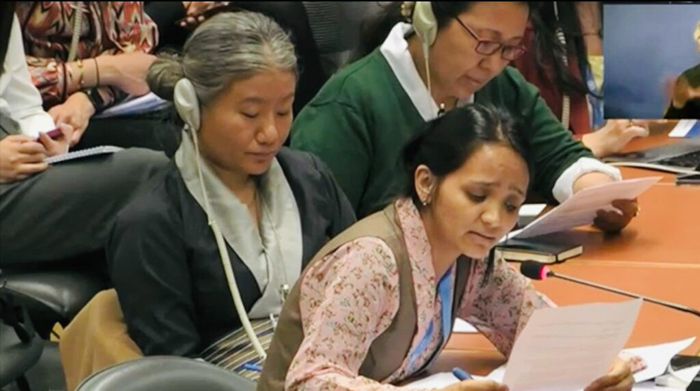Geneva – The Tibet Bureau and the Tibetan Women’s Association delivered a joint statement on the situation of Tibetan Women in Tibet, at a UN public briefing for the 85th session of the Committee on Elimination of Racial Discrimination (CEDAW), on May 8, 2023. They said, "Tibetan women continue to face multiple challenges for securing equal opportunity in the field of education, economic activities and gender-specific hiring and recruitment practices. The discrimination against Tibetans in Tibet is widespread."
According to the Tibet Bureau, Geneva, The Tibet Bureau and the Tibetan Women's Association issued a joint statement on the situation of Tibetan women in Tibet at a UN public briefing for the 85th session of the Committee on the Elimination of Racial Discrimination (CEDAW), held on May 8, 2023. The committee will review the status of China's implementation of the International Convention on the Elimination of All Forms of Discrimination against Women on Friday, May 12, 2023.
Representative Thinlay Chukki, Kalden Tsomo, UN Advocacy Officer of the Tibet Bureau, and Tenzing Dolma, President of the Central Tibetan Women's Association (TWA), attended the meeting and met with the UN committee members to inform them of the situation of Tibetan women in Chinese occupied Tibet.
Kalden Tsomo delivered a statement on the situation of Tibetan women in Tibet, on behalf of the Tibet Bureau and the Tibetan Women's Association at the UN public briefing for the 85th session of the Committee on the Elimination of Racial Discrimination (CEDAW), which was held on May 8, 2003
UN Advocacy Officer of the Tibet Bureau said, "Gender bias against women remains widespread in Tibet. Tibetan nuns are forced to wear nonreligious clothing to avoid harassment. Often, taxi drivers outside of Tibetan areas refused to drive for them, hotels refused to provide lodging, and Han Chinese landlords refused to rent rooms for Tibetans. Such deep rooted societal discriminatory practices make Tibetan women more vulnerable and sidelined from undertaking independent social and economic activities."
"Due to harassment and systematic repression against the religious practices, there are several known cases of suicide committed by Tibetan nuns. For instance, Tsering Dolma, Rigzen Dolma, Semgha and several other unidentified Tibetan nuns from Yachen Gar committed suicide in protest against forced demolitions of their Buddhist learning centers and forced expulsions of nuns from the centers," she continues.
"China’s relentless efforts to assimilate Tibetan culture and identity through different social policies are of serious concern. In particular, the propagation and policies enforcing interethnic marriages between Han Chinese and Tibetans, in the name of “unity” and “harmony”, severely curtailed personal freedoms, including choice of marriage partner. Tibet Autonomous Region then Party Secretary Chen Quanguo, who was later moved to Xinjiang, called upon all key officials in Tibet to act as “matchmakers”6. In addition to restrictions against cultural and religious life of Tibetan women, the imposition of marriage partners not only undermined the existence of a free Tibetan culture and way of life, but made Tibetan women more vulnerable to forced marriage," Tsomo added.
"Tibetan girls were often called by Chinese teachers in their chamber and sexually harassed. When the girls did not comply, they were slapped and kicked. As a means to escape from such an abusive environment, many cases of substance abuse and suicide among children, especially girls, have been reported. Tibetan women rights defenders, including those that promote gender equality and equal participation in the political sphere, are suppressed systematically," the statement said.
"Under pervasive control in Tibet by the People’s Republic of China, Tibetan women are further marginalized and disempowered from taking part in social, economic and cultural life in Tibet. Any form of conventional peaceful expression of thoughts and grievances are suppressed brutally. Due to which, since 2009, over 159 Tibetans, including Tibetan women, have resorted to self-immolation protests calling for freedom in Tibet and return of His Holiness the Dalai Lama to Tibet," the statement mentioned.
"China claims to have made considerable improvement in the field of education, economic, healthcare, and equal employment rights. Testimonies and research conducted by TWA have revealed different realties, far from China’s claim. In particular, Tibetan women continue to face multiple challenges for securing equal opportunity in the field of education, economic activities and gender-specific hiring and recruitment practices. The discrimination against Tibetans in Tibet is widespread. Additionally, Tibetan women are often discriminated against compared to both men and Chinese women," the statement said.


![Tibet has a rich history as a sovereign nation until the 1950s when it was invaded by China. [Photo: File]](/images/stories/Pics-2024/March/Tibet-Nation-1940s.jpg#joomlaImage://local-images/stories/Pics-2024/March/Tibet-Nation-1940s.jpg?width=1489&height=878)
















